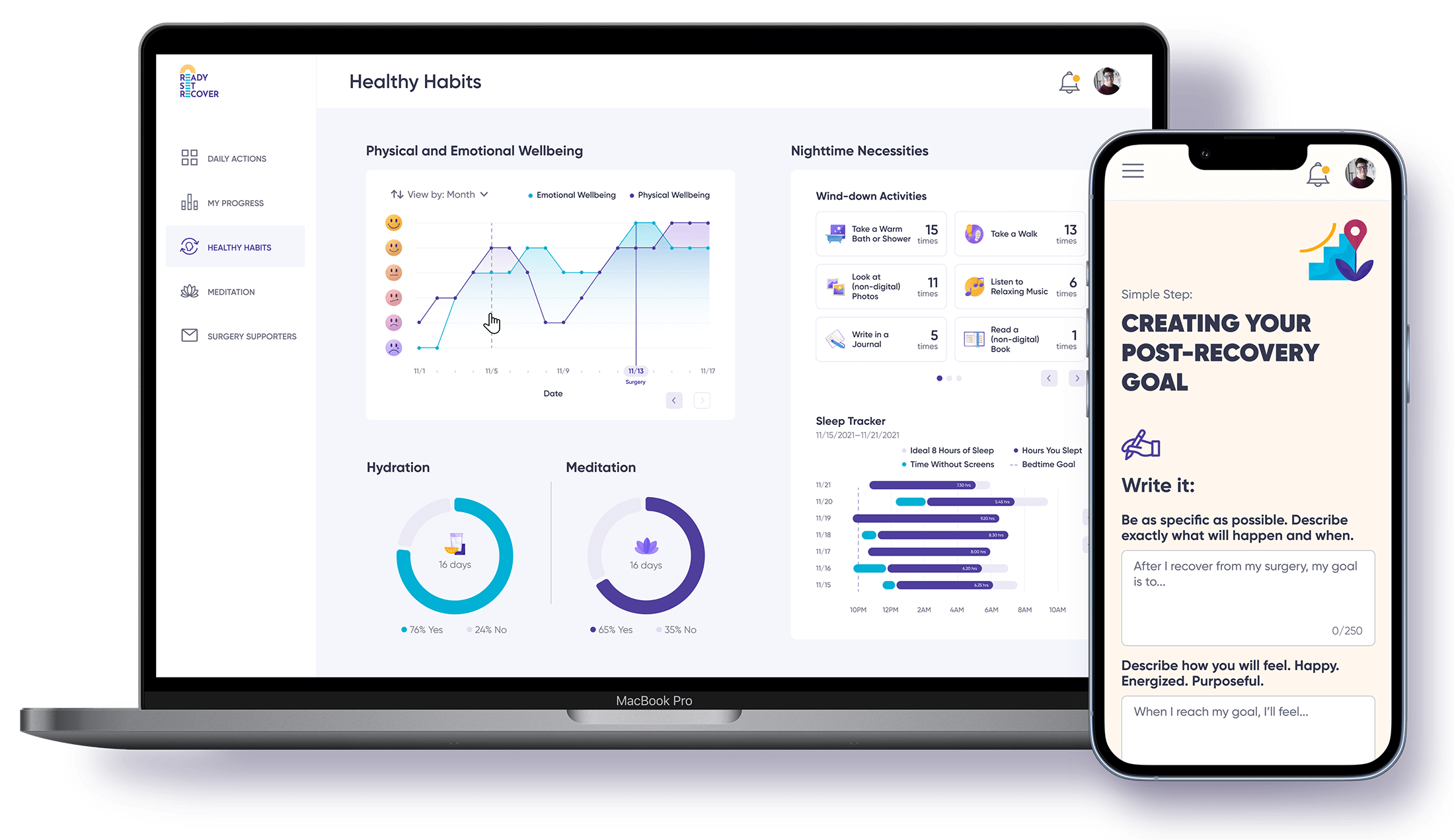Prehabilitation: Get Ahead of the Curve with the Transformative Benefits of Surgery Preparation


Are you preparing for surgery and looking for ways to optimize your outcome? Surgery prehabilitation, a proactive approach that empowers you to take charge of your perioperative care, can maximize your physical and mental well-being before surgery. With the potential to revolutionize modern healthcare, prehabilitation exercises are quickly becoming an essential aspect of surgical preparation, particularly in fields like cancer care. So, are you ready to get ahead of the curve? Let’s explore the transformative benefits of surgery prehab!
Key Takeaways
Prehabilitation is an invaluable tool for optimizing physical and psychological health before surgery.
Prehabilitation empowers patients to take a proactive role in their perioperative care, leading to better surgical outcomes and improved quality of life.
Customized prehabilitation programs tailored to individual needs maximize surgical success & enhance patient well-being.
Introduction

Prehabilitation is a powerful process that aims to enhance a patient’s functional capability before a surgical procedure, ensuring they remain resilient during postoperative inactivity and associated decline. As a proactive approach to surgical preparation, it’s gaining increasing importance in modern healthcare, especially for patients undergoing certain types of surgery, such as cancer treatment.
Brief overview of what surgery prehabilitation is.

Surgery prehabilitation, often referred to as “prehab,” is a proactive process that includes targeted exercises, nutritional planning, and mental health support to optimize your overall health before surgery. Prehab programs are designed to take advantage of the perioperative period, a time when individuals may be more receptive to structured behavioral interventions. Involvement of a multidisciplinary team of clinical and non-clinical staff throughout this phase ensures patients receive optimal care and support.
The concept of prehabilitation dates back to 1946 when the British Army initiated a prehabilitation program to enhance recruits' physical and mental conditioning before enlistment during World War II. It has become increasingly popular in recent years, particularly for patients undergoing cancer treatment and seeking effective cancer care.
Emphasis on its growing importance in modern healthcare.
Prehabilitation has grown in importance due to its potential to transform patient outcomes and experiences. With recent studies highlighting its significance, prehabilitation is recognized as a key aspect of modern healthcare for surgical patients. This proactive approach has the power to improve physical fitness, reduce anxiety, and speed up post-surgery recovery.
Furthermore, prehabilitation enables patients to take a more active role in their perioperative care, paving the way for better surgical outcomes and an improved quality of life by addressing patient prior concerns.
The Benefits of Prehabilitation

Physical Advantages: Improving strength and stamina pre-surgery.
One of the primary benefits of prehabilitation is the improvement in physical fitness before surgery. By engaging in targeted exercises and maintaining an active lifestyle, patients can increase their strength, stamina, and overall functional capacity. This enhanced physical condition can reduce the risk of postoperative complications and lead to a smoother recovery after surgery.
Moreover, good physical fitness can also help ensure a more successful surgical outcome and quicker return to daily activities, especially for those experiencing knee pain and aiming for weight loss.
In addition to these benefits, prehabilitation can also help patients develop better habits that contribute to long-term health and wellness. For instance, the exercise routines and dietary changes adopted during prehabilitation can become part of a healthier lifestyle, reducing the risk of chronic diseases and improving overall quality of life. Furthermore, prehabilitation can foster a sense of empowerment and control over one's health, which is particularly important in the often stressful period leading up to surgery. By taking an active role in their own health care, patients can experience a boost in confidence and mental resilience, which can be invaluable during the recovery process.
Psychological Benefits: Reducing anxiety and improving mental preparedness.

Prehabilitation also addresses the psychological aspects of surgery, helping patients reduce anxiety, and improve mental preparedness for the upcoming procedure. By focusing on stress management techniques, such as breathing exercises, relaxation techniques, and mindfulness, patients can better cope with the emotional challenges of surgery and experience a more positive outcome.
Furthermore, reducing preoperative anxiety has been shown to improve postoperative recovery and overall patient satisfaction.
In addition to these techniques, cognitive-behavioral therapy (CBT) can be a highly effective tool in prehabilitation. CBT helps patients reframe negative thoughts and develop healthier coping mechanisms, which can significantly reduce pre-surgery anxiety and improve mental resilience. Support groups and counseling sessions also play a crucial role in providing emotional support and fostering a sense of community among patients facing similar challenges.
Engaging in activities that promote mental well-being, such as journaling, art therapy, or even light physical activities like yoga, can further enhance mental preparedness. These activities not only reduce stress but also contribute to a more balanced and positive outlook, which is essential for a successful surgical outcome.
Incorporating a holistic approach that addresses both the mind and body ensures that patients are in the best possible state to undergo surgery, leading to better overall experiences and outcomes.
Faster Post-Surgery Recovery: How prehabilitation can shorten recovery time.
A key advantage of prehabilitation is its potential to shorten recovery time following surgery. By optimizing physical and mental health before the procedure, patients are better prepared for the challenges of postoperative recovery. Research has shown that prehabilitation can lead to a quicker return to normal functioning and a more rapid recovery process.
Furthermore, patients who engage in prehabilitation programs tend to have lower postoperative complication rates and shorter hospital stays, further emphasizing the positive impact of prehabilitation on recovery.
Reduced Complication Rates: Evidence showing lower risks during and after surgery.
Prehabilitation has been shown to reduce complication rates during and after surgery. By improving a patient’s overall physical fitness and mental well-being, prehabilitation can lower the risks associated with surgery and enhance patient outcomes.
Studies have demonstrated that patients who participate in prehabilitation programs experience fewer postoperative complications and enjoy better overall results. These findings underscore the transformative potential of prehabilitation in modern healthcare.
Implementing Prehabilitation into Your Surgery Plan

Incorporation of prehabilitation into your surgical plan is a crucial step towards enhancing your perioperative care and assuring a favorable outcome. By working with healthcare professionals, creating a personalized prehabilitation program, and staying committed to your regimen, you can set yourself up for success before, during, and after surgery.
Consulting with healthcare professionals.
Obtaining expert advice from healthcare professionals is of utmost importance while formulating a comprehensive prehabilitation plan. Your primary care provider, surgeon, physical therapist, and dietitian, among others, can offer valuable insights and recommendations tailored to your unique needs and goals.
Collaboration with these professionals helps ensure that your prehabilitation plan is both safe and effective, ultimately leading to a more successful surgical outcome and recovery.
Tips for sticking to the prehabilitation regimen.
Maintaining motivation and commitment throughout the prehabilitation process is key to achieving the best possible outcome. Here are some strategies to help you stay on track:
Set clear goals
Seek support from family and friends
Celebrate progress
Stay consistent with your regimen
By following these strategies, you can ensure the success of your prehabilitation interventions program.
By staying focused and committed to your prehabilitation plan, you can optimize your surgical outcome and enjoy a smoother, faster recovery.
The Role of Technology in Prehabilitation
Technology offers exciting opportunities to enhance prehabilitation efforts and improve patient outcomes. From online platforms and telemedicine to wearables and monitoring devices, emerging technologies can help patients stay motivated, track their progress, and optimize their preoperative preparation.
Use of online platforms for tracking progress, reducing stress and optimizing outcomes.
Online platforms can be incredibly beneficial in supporting prehabilitation efforts by providing an easy way to track progress, reduce stress, and optimize outcomes. One such platform is Ready Set Recover, a tool designed specifically to help patients prepare for surgery. These digital tools offer real-time feedback and data, helping patients stay motivated and make necessary adjustments to their prehabilitation plan.
By leveraging technology and resources like Ready Set Recover, patients can better manage their preoperative preparation and enjoy improved surgical outcomes.
Telemedicine and virtual consultations.
Telemedicine and virtual consultations offer a convenient and accessible means of providing prehabilitation services to patients, regardless of their location or schedule. Remote healthcare services can help patients receive expert guidance and support, while also allowing healthcare professionals to monitor progress and make adjustments to prehabilitation plans as needed.
By embracing telemedicine, patients can access the care they need to optimize their surgical outcomes and recovery, including elective surgery consultations.
Wearables and monitoring devices.
Wearables and monitoring devices can play a significant role in enhancing prehabilitation efforts by providing real-time feedback on physical activity levels, heart rate, and other key health parameters. By tracking and monitoring this data, patients can stay motivated, make necessary adjustments to their prehabilitation plan, and optimize their overall health and well-being.
Wearable technology offers a powerful tool for patients to take control of their preoperative preparation and achieve the best possible surgical outcome.
Challenges and Considerations
Addressing common barriers to prehabilitation.
Identifying and overcoming common barriers to prehabilitation is crucial for successful implementation and patient outcomes. Factors such as access to healthcare services, financial constraints, and lack of awareness about the benefits of prehabilitation can all present challenges for patients seeking to engage in preoperative preparation.
By addressing these obstacles and providing support, healthcare professionals can help patients access the resources and care they need to optimize their surgical outcomes.
Tailoring programs to individual needs and conditions.
Adapting prehabilitation programs to suit individual conditions and requirements is essential for ensuring the best possible outcome for each patient. Factors such as age, pre-existing conditions, and baseline fitness levels should all be considered when designing a personalized prehabilitation plan.
By tailoring prehabilitation programs to meet each patient’s unique needs and goals, healthcare professionals can help optimize surgical outcomes and improve overall patient well-being.
Summary
Surgery prehabilitation is a powerful and transformative approach to surgical preparation that empowers patients to optimize their physical and mental health before surgery. By engaging in targeted exercises, nutritional planning, mental health support, and leveraging technology, patients can enjoy improved surgical outcomes and a faster recovery. As the importance of prehabilitation in modern healthcare continues to grow, patients and healthcare professionals alike can expect a brighter future for surgical care and recovery.
Frequently Asked Questions
What is prehabilitation?
Prehabilitation is a proactive approach taken before a surgery or medical intervention. It focuses on optimizing an individual's physical and mental health to increase strength, stability, balance, and mobility. This preparation helps reduce the risk of postoperative complications and ensures a faster recovery after surgery.
What is an example of prehabilitation?
Prehabilitation can include simple steps to avoid complications, such as cutting down on alcohol for improved liver health, or quitting smoking to reduce the risk of chest infection. Exercise combined with nutrition interventions and stress reduction are also beneficial prehabilitation techniques.
What does prehab exercise mean and why is it important?
Prehab exercise is an important proactive step that sets you up for a successful recovery after surgery. Physical therapists assess your strength, stability, range of motion and balance to ensure your body is prepared for the surgery. Prehab exercise is key to helping you recover efficiently.
What conditions are best served by a prehabilitation exercise program?
A prehabilitation exercise program can be incredibly beneficial for those living with conditions such as arthritis, joint pain, or balance issues. It is also useful for those who are recovering from surgery or injury to help restore strength and function quickly.







